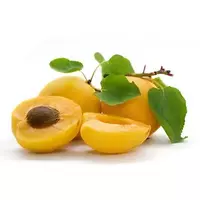Apricot

China is unanimously recognized as the birthplace of apricot, where it is still found in the wild in mountainous areas. Then the apricot was brought to the Caucasus, from where its modern history begins. In translation, the name of the fruit means "Armenian apple, " indicating the prevalence of apricot in the mountains of the Caucasus. Apricot is currently cultivated in many warm and temperate countries.
There are a large number of different varieties of apricots, which vary in size, shape and color. The aroma and sugar content may also differ. Apricot is consumed fresh, it is dried, added to a wide variety of confectionery products, and juice is prepared. Apricot juice has a delicate and pleasant taste and a gorgeous aroma.
Apricot benefits
Since ancient times, the use of apricot for medicinal purposes has been known. And this is no coincidence. The beneficial properties of apricot are determined by the rich content of substances indispensable for human health. The composition of apricot includes vitamins A, B, C, acids: citric and apple, salicylic and wine, as well as iron, silver and mineral salts and insulin. Thanks to all these substances, apricot significantly improves the hematopoietic process, so it is indicated in people with diseases of the cardiovascular system.
The benefits of apricot have also been proven when used to strengthen weakened immunity. The beta-carotene found in apricot helps restore vision and improve skin condition. It also prevents the development of cancer tumors. The content of bet-carotene in apricot is such that 300 gr. fruits are able to fully meet the daily need of the body for this vitamin. Phosphorus and magnesium are essential for excellent brain function, so apricots are useful for children, because they help to concentrate and maintain better during mental stress. The presence of potassium and iron in the fruit speaks of the benefits of apricot for patients with anemia, and experts also advise to include it in the diet of pregnant women.
Juice, pulp and apricot seed oil have found widespread use in cosmetology. Apricot masks perfectly rejuvenate and refresh the skin, in addition, they smooth fine wrinkles, prevent the face from drying out. Traditional medicine recommends the active use of apricot for sunburn. The flesh of this wonderful fruit is able to relieve inflammation and soothe itching.
Damage to apricot
The calorie content of apricot is only about 44 kcal. per 100 gr. , but it is not recommended for patients with ailments such as diabetes mellitus and obesity due to high sugar content. Apricot can be harmful when consumed on an empty stomach, as it contains substances that can irritate the mucous membrane of the gastrointestinal tract. Therefore, apricots can provoke an exacerbation of diseases such as stomach ulcer, gastritis, pancreatitis.
apricot 44 kCal
Energy value of apricot (Ratio of proteins, fats, carbohydrates - ju):
Proteins: 0.9 g (~ 4 kCal)
Fats: 0.1 g (~ 1 kCal)
Carbohydrates: 9g (~ 36kCal)
Energy ratio (bj | y): 8% | 2% | 82%
 Español
Español Français
Français Português
Português Русский
Русский 简体中文
简体中文 繁體中文
繁體中文 日本語
日本語 한국어
한국어 العربية
العربية Türkçe
Türkçe Қазақ
Қазақ Deutsch
Deutsch Italiano
Italiano Українська
Українська
